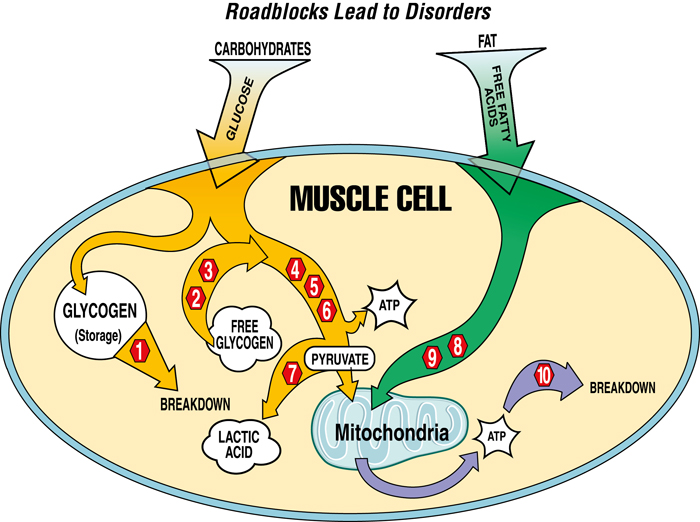McArdle's Disease
Brianne Sliwiany
What Is a Genetic Disorder?
A genetic disorder is an abnormality in the DNA of an individual. Genetic disorders can often be inherited because they are mutations in the germ cells of the body. Germ cells are the cells that are involved in passing genetic information from a parent, to their offspring. Genetic disorders can be passed down from many generations of family, but are not always inherited. They may be caused by changes in the DNA that are not made up from germ cells and instead in the somatic cells.
What is McArdle's Disease? (Also known as McArdle's Syndrome)
McArdle’s Disease is a rare, muscle condition that is inherited and affects approximately 1 in 100,000 people. People that suffer this condition cannot properly metabolize energy which causes severe muscle pain and cramping.
How is a person unable to metabolize enerygy?
- An individual is not able to metabolize energy because they are unable to produce an enzyme known as phosphorylase or myophosphorylase. This enzyme is needed to break down glycogen, which is the stored form of sugar. Without the enzyme, glycogen cannot be used to produce energy during exercise which results in a person affected by this disorder to experience fatigue and failure during exercises that strain the body's muscular system such as jogging or swimming
So If I Have McArdle's Disease, Am I Not Able to Exercise?
-The episodes that the affected individuals have during exercise can cause painful cramps and injuries, and affect physical limitations to a great degree. But, the disease is not life-threatening, so with the proper precautions and diet/fitness management, people that are diagnosed with McArdle's Disease can live an active, healthy life
Symptoms:
Usually symptoms occur in early childhood, but are sometimes difficult to detect and are therefore diagnosed in a persons early twenties or thirties. A person that is affected by McArdle's will be likely to experience a great amount of pain within their first couple of minutes of exercising. If the individual continues to exercise through the pain, they may experience muscle spasms which can lead to muscle damage. They muscles may stiffen or weaken, depending on the affected individual. Some people experience pain in their jaw muscles when chewing or speaking and have burgandy-colored urine.
Tests and Exams:
To confirm that you have McArdle's, diagnosis starts with taking a simple blood test to check if certain enzymes are at high levels. In the past, the only way of diagnosing McArdle's was by a muscle biopsy (removing a small amount of muscle tissue for closer examination), but thanks to advances in research, the disease is able to be diagnosed through genetic testing. The disease is also able to be diagnosed by taking an electromyogram, a test where a thin needle is stuck into the muscle picking up the electrical activity given off and then the results are projected onto a monitor. The electrical activity on the monitor provides information about the muscles ability to respond when the nerves are stimulated.
Treatment:
There is no cure for McArdle's disease, but affected individuals are able to take many precautions in order to live an active and healthy life. Managing the symptoms of McArdle's disease is helpful and easy. Improving exercise tolerance and controlling physical activity by avoiding intense exercises is the best thing to do. The other thing is to have a supply of glucose on hand to replace energy.
How is McArdle's Disease Inherited?
McArdle's disease is caused by a recessive gene disorder meaning that both parents must have the defective gene.
| (blank) |
M (dominant gene) |
m (recessive gene) |
| M (dominant gene) | MM (non-carrier, not affected)lo | Mm (carrier, not affected) |
| m (recessive gene | Mm (carrier, not affected) | mm (carrier, affected) |
When both parents are carriers, there is a 25% chance that the offspring will inherit McArdle's disease. If only one parent has the recessive gene, the offspring is likely to become a carrier. Carriers do not normally experience the symptoms, but may pass the gene on to their offspring

This image shows how carbohydrates and fat are used in a muscle. Knowing that McArdle's Disease is caused by the body's inability to breakdown glycogen, we are able to see that the body cannot produce energy, therefore it cannot pass step 1 which is the breakdown of the glycogen.
What is Gene Therapy?
Gene therapy is a technique that allows scientists to block defective genes or even add healthy ones. It is used in order to correct genetic disorders. There are several methods for inserting genes into cells. One method uses an altered virus. A virus normally attacks cells by attaching to the cell's outer membrane and then pushing its own DNA into the cell. The viral DNA uses the host cell to make copies of itself. In an altered virus, scientists splice a healthy gene into the viral DNA, then let the virus transfer the gene into the individuals cells.
Has Gene Therapy used for McArdle's Disease?
I don't believe gene therapy has been used to try and stop McArdle's disease only because there is not cure for the syndrome. After researching, nothing had come up as to using gene therapy to help prevent the disease so making the assumption it hasn't been used, it sounds like it could potentially work if it was tried but it would be very difficult because McArdle's Disease is not easy to detect.
Bibliography:
http://www.muscle.ca/fileadmin/National/Muscular_Dystrophy/Disorders/McArdles_E.pdf
http://health.nytimes.com/health/guides/disease/mcardle-syndrome/overview.html
Sciencepower 9 textbook
Picture Bibliography: